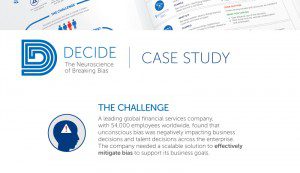As coronavirus cases and deaths spiked around the world, so did an equally pervasive, but less observable ailment—anxiety. The effects of anxiety—reduced productivity and a lack of focus to name just two—have been felt widely among the global workforce, causing leaders to rightly ask, What can be done to stem the tide and restore calm to employees? We asked the same question. Specifically, we asked a host of questions of 688 survey participants and reviewed the relevant scientific literature. Through our research, we sought to understand the extent of the pandemic’s rippling cognitive and emotional effects and what leaders can do to alleviate them, cultivate well being, and instill confidence in their workforces. Our findings are compiled in our recent Idea Report, “The Mind in Crisis: Understanding employees’ needs in a changed workplace.” Among the most interesting and important findings is that employees who felt they were part of a team were significantly less anxious than those who didn’t. Moreover, there are things leaders can do to cultivate that camaraderie and reduce anxiety. Here’s how. The science and power of relatedness To feel a part of a team is to feel valued and heard, or in a word, included. At NLI, we use the SCARF® model, which defines five key domains of social threat and reward (Status, Certainty, Autonomy, Relatedness, and Fairness), to understand how we can intentionally include others on a daily basis. Specifically, we can understand the feeling of being part of a team through the lens of relatedness. Relatedness is our innate need to belong to groups that offer us safety, shelter, and acceptance, and it’s been shown to be an important factor of a person’s ability to thrive, both in general and in the workplace, especially in times of crisis. We all know this intuitively from experience—humans have a natural reflex action to come together in a crisis. When we gather with friends and family in the wake of a crisis, we balance out the lack of certainty and feelings of having no control with the reward of being with others we trust. We create relatedness. We face a crisis now, but our physical isolation from other people may threaten our basic need for belonging and companionship, depriving us of our relatedness and exacerbating our anxiety. Therefore, cultivating a sense of organizational and interpersonal connectedness is crucial to helping your remote employees feel less isolated and less anxious. Organizations can cultivate relatedness by holding online all-hands meetings, or regular virtual morning coffee breaks or happy hours, where people stop work and just chat for 30 minutes. At a firm NLI partners with, people are creating relatedness by encouraging folks to change their backgrounds when on video, and then sharing what their background means to them—perhaps a photo from a vacation, or just a beautiful scene. Try this at 4:45 pm every day: Invite your team to a virtual group hangout to share what they have made progress on. Learn more This is just one of the findings of our latest research on the effects of the pandemic. Read about the other insights from NLI’s Idea Report, “The Mind in Crisis: Understanding employees’ needs in a changed workplace,” by clicking the link below and grabbing your copy today. [action hash= “638a5f77-c66e-49e6-b610-592c6dc17ae6”]




